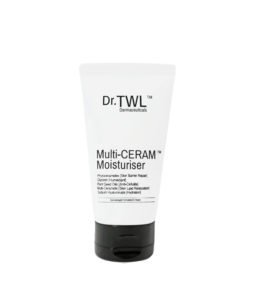Can’t get rid of the itch? You could be suffering from dry, sensitive skin.
There is nothing more frustrating than relieving an itching sensation, only to be left with a flaky, peeling patch which starts to itch again. If the problem persists, it could be a sign of dermatitis (or an inflammation of the skin, commonly known as ‘eczema’). Fortunately, this vicious cycle can be reversed with the appropriate topical and oral medications for your skin, along with a proper long-term skincare maintenance plan.
Root cause of dermatitis
Our skin is made up of 3 layers – epidermis, dermis and hypodermis. The epidermis is the outermost layer of our skin which forms a protective barrier between the external environment and our body.
Dermatitis is usually caused by a barrier dysfunction in the skin and/or abnormalities in the immune system, causing an overreacted immune response to infections on the skin. If you imagine the epithelial cells on the outermost layer of our skin as the bricks of a building, the ‘cement’ which holds the ‘bricks’ or the cells together is a lipid molecule called ceramide.
A common dysfunction in the skin is when the body does not produce enough ceramide to retain moisture and prevent bacteria, toxins, viruses and carcinogens from entering the body. Although this process is dictated by your genes, you can alter the amount of ceramide in your skin by applying moisturizer with ceramide and hasten the healing process with other medications recommended by your dermatologist.
Common Triggers
While your skin type is largely dependant on your genetic makeup, there are a few environmental factors which may aggravate the itching sensation such as:
- Perspiration
- Exposure to sun
- Common allergens found in skincare products
Treatment
- Moisturizer with ceramide and hyaluronic acid – retains moisture in skin to improve skin barrier function
- Topical steroids – to reduce itch, redness and swelling
- Sunscreen – relieves photoaggravated eczema
- Oral medication e.g. antihistamine – relieves itching
Long-term skincare maintenance
There is currently no cure for eczema but fret not, it is still possible to manage the symptoms. If you are more comfortable treating eczema at home, it is advisable to start with a moisturizer with ceramide. It is important to plan and follow a skincare routine that is tailored to your skin type to maintain the health of your skin and prevent future flare-ups. You may visit a dermatologist for a professional diagnosis and specific treatment for your skin type.
© 2019 TWL Specialist Skin and Laser Centre. All rights reserved.
—–
Meet with Dr Teo Wan Lin, an accredited dermatologist at TWL Specialist Skin & Laser Centre, for a thorough consultation to determine the most suitable treatment for your skin.
To book an appointment with Dr Teo, call us at +65 6355 0522, or email appt@twlskin.com. Alternatively, you may fill up our contact form here.
—–



